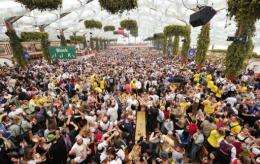Germany's giant beer party deploys stench-eating bacteria

Germany's giant Oktoberfest beer party, now celebrating its 200th birthday, is rising to a new challenge -- stinky drinking halls -- with a new weapon: stench-eating bacteria.
In past years, olfactory offences in the giant tents emanating from stale beer, sweat and bratwurst could simply be masked with cigarette smoke.
But now smokers hoping to enjoy a puff with their brew were advised to leave their packets at home after the southern state of Bavaria decided to ban smoking across the state in all pubs, cafes and beer tents.
Although the Oktoberfest, which started Saturday, enjoys a special exception for this year, most beer tents serving the up to six million visitors expected at the two-week-long event were observing a voluntary ban.
This development led one enterprising German, Hubert Hackl, to cook up a cocktail of bacteria that "eat" the putrid smell of partying.
Hackl's magic potion is a "brownish liquid with the pleasant scent of humus", or mature compost, he said, rounded off with a hint of seaweed and molasses then left to ferment.
"This is the most natural way of treating organic waste," Hackl said.
The elixir faces a formidable opponent.
The beer halls, where up to 7,000 revellers can gather, are usually poorly ventilated. The stale air combined with rotten food scraps, spilled drinks and body odour can form a noxious mix.
Spread across the wooden floorboards of the beer tents at a volume of 200 millilitres (seven ounces) per square metre (yard) per day, Hackl's concoction travels the same route as the spilled beer, seeping between the planks and into the soil.
The process eliminates the undesirable organic materials nestled under the tents, ensuring that what wafts back up has a neutral earthy smell.
What remains is "a natural fertiliser for grass growing back in the spring," said Hackl, who has been supplying detergents and other cleaning products to the beer festival for 28 years.
However some tent proprietors remained sceptical and preferred to rely on conventional methods.

"The little bit of beer that flows into the soil is not really a problem," said Peter Schottenhamel, 69, owner of the oldest beer tent at Oktoberfest, which was opened by an ancestor in 1867.
The burly, clear-eyed Munich native has opted to invest in a better ventilation system.
But many taverns were game to try out the new bacteria brew.
"We are experimenting with this method for the first time," said Renate Heide, who runs the beer hall Braeurosl, capacity 6,200.
The largest of the lot, the imposing Hofbraeu, offers seats for 7,000 revellers. It was the first to test the product over the last two years, manager Friedrich Steinberg said, "particularly at the counters where odours accumulate".
"Things are much better in the toilets too," Steinberg told AFP as he hung "No Smoking" signs in the premises.
Oktoberfest, billed the world's largest festival of its kind, runs to October 4.
(c) 2010 AFP
















